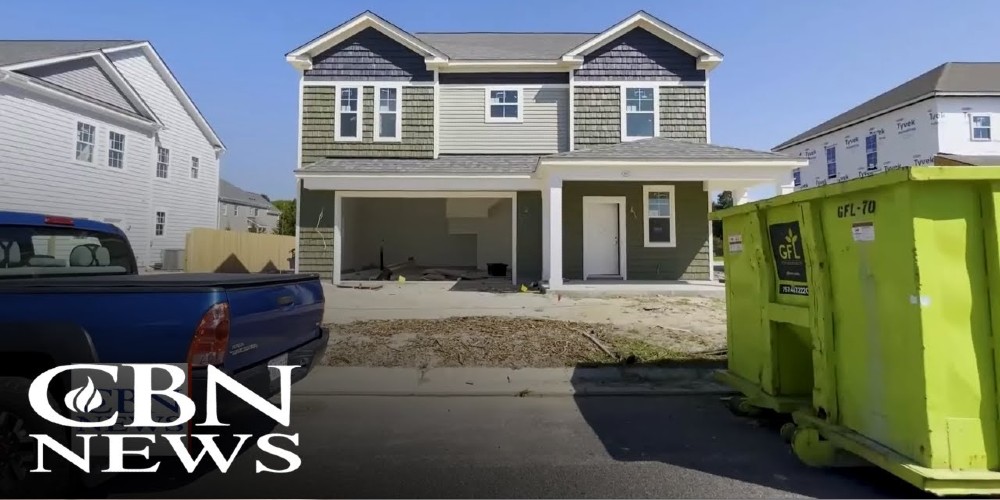(CBN)—Housing costs in America have skyrocketed, leaving many families struggling to keep up. The shortage of affordable housing has created a crisis, forcing people to choose between basic needs and a place to live.
While many high-end houses are being built at a steady pace, millions of Americans are struggling. Many low-income families spend more than half of their paycheck on rent, leaving them barely able to afford even the most basic housing.
“This rent is ridiculous, I don’t know what’s going on in the world,” said one renter in Norfolk, Virginia.
Experts blame a number of reasons behind this and expect it to get worse.
“We are in a housing crisis,” said Will Fish with the Center on Budget and Policy Priorities. “There are hundreds of thousands of people in this country who have no home at all.”
He went on to say a record 653,000 Americans experience homelessness any given night – a stark reminder of people living on the margins.
“There are many more millions who are paying very high shares to their income for rent, and are often, you know, just one step back away from being evicted and losing their home,” Fish said.
For others like Cherise Ryan, a student juggling school and a part-time job, the burden of rising rent is a bit overwhelming.
“It’s affecting me because I’m in school right now and I’m not working,” said Ryan. “So, you know, (I’m) trying to be in school and doing a little Ubering to pay the bills.”
Vanessa Brown Calder from the CATO Institute highlights how the transformation of many cities into luxury hubs – where the average home now costs $1 million or more – is driving rent prices to outpace income growth. For instance, studies indicate that since 2000, rents have surged by over 50%, while average incomes have only increased by about a third of that rate.
She also notes construction costs and zoning restrictions complicate the affordable housing puzzle.
“What’s happening here is we are just not able to build enough housing, even with higher construction levels, we are not able to build enough housing to make up for the big hole that we are in,” Calder said.
That hole she references is a shortage of nearly 20 million homes, widening the gap between available homes and potential buyers.
“I do think that the private market is the solution to housing affordability issues,” said Calder. “The private market can only be unleashed to solve those problems if the government gets out of the way and removes some of this unnecessary red tape and restrictive regulation. We need policymakers leading the charge to reform government regulations.”
Certain states are taking the lead, making significant changes in reforming housing policies. Legislators in both red and blue states have moved to modernize zoning laws, streamline the residential planning process, and update standards for home building and design.
Progress is being made in Virginia Beach, with a move toward ‘workforce housing’ designed to help blue-collar families, including police officers and firefighters, afford a place to live in this competitive market. Despite criticism, this approach exceeds city zoning regulations and removes land once zoned for farming.
There are also private efforts like the Kingdom Builder Group in Phoenix, stepping up in faith to help.
“We want people to know that we’re different,” said Patrick Smythe, President of Kingdom Builder Group. “We’re trying to build the kingdom through providing housing – and really just showing people the love of Christ in all that we do; how we treat our customers, how we treat our subcontractor partners.”
Partnering with Boxabl, a group designing prefabricated homes, the group focuses on affordable construction for low-income families and veterans. They also collaborate with churches and veteran organizations to create sustainable projects that support the city’s spiritual and social needs.
“The current zoning ordinances in all municipalities across the country are kind of antiquated,” Smythe said. “You know, I could build 20 units in six months, if the government would do the zoning and get out of the way.”
As housing costs likely continue to rise, so will the need for affordable, working-class housing. The hope is reforms will expand beyond the state-level and private market to bring Americans-in-need closer to the dream of stable, affordable homes.
What Would You Do If Pharmacies Couldn’t Provide You With Crucial Medications or Antibiotics?
The medication supply chain from China and India is more fragile than ever since Covid. The US is not equipped to handle our pharmaceutical needs. We’ve already seen shortages with antibiotics and other medications in recent months and pharmaceutical challenges are becoming more frequent today.
Our partners at Jase Medical offer a simple solution for Americans to be prepared in case things go south. Their “Jase Case” gives Americans emergency antibiotics they can store away while their “Jase Daily” offers a wide array of prescription drugs to treat the ailments most common to Americans.
They do this through a process that embraces medical freedom. Their secure online form allows board-certified physicians to prescribe the needed drugs. They are then delivered directly to the customer from their pharmacy network. The physicians are available to answer treatment related questions.



